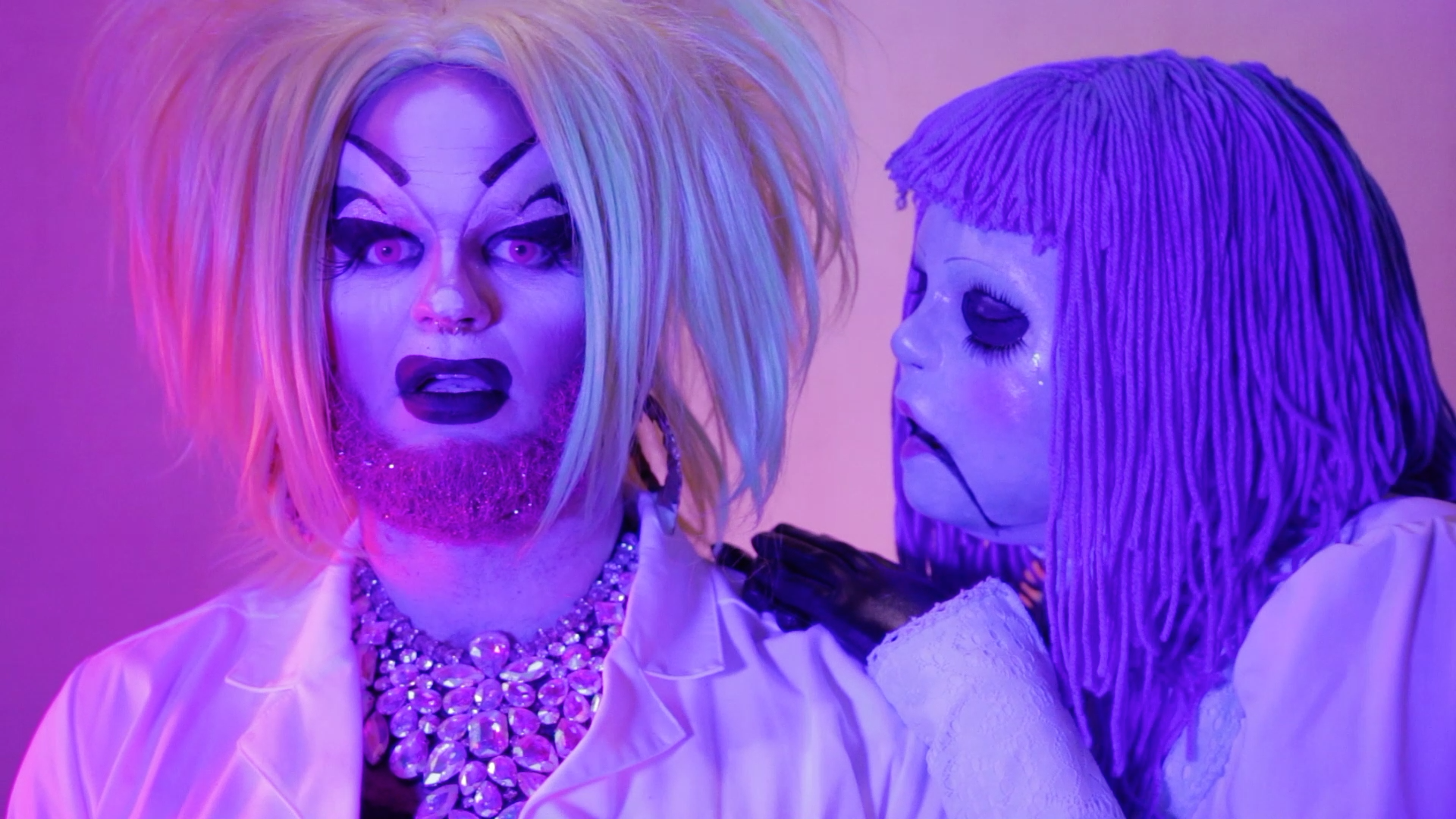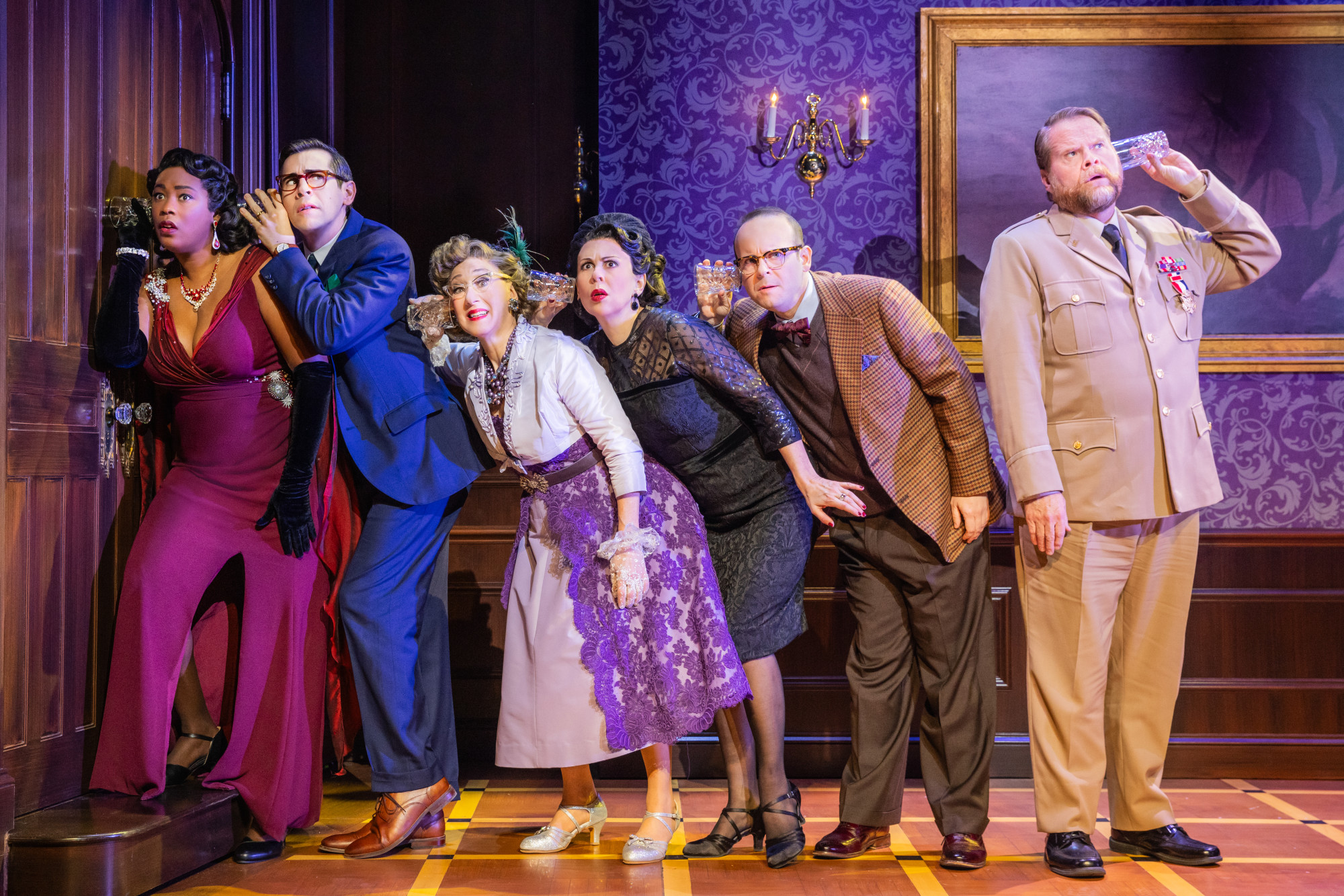Reviews
‘Kill Dolly Kill’ Fantastic Fest Review – A Mixed Bag of Campy Trash

While the theme of Fantastic Fest this year is occultism/Satanic panic, the “junior” theme of the fest could easily be The Wrath of Troma, given that the opening night film of the festival was the long-awaited remake of The Toxic Avenger (review) and the studio is also bringing us Heidi Moore‘s Kill Dolly Kill. It’s a micro-budget film with horrendous production values and some truly terrible performances, so about what you’d expect from a modern Troma film, but a committed lead performance and some transgressive humor make for a mildly entertaining romp through the streets of Tromaville.
A follow-up to Moore’s 2016 film Dolly Deadly, Kill Dolly Kill sees Tromaville’s local celebrity murderess, Dolly Deadly (Donna Slash) in competition to win Serial Killer of the Year. Unfortunately, rival drag queen Slasherella (Amy Vodkahaus) has designs on the title and will stoop to the lowest of lows to take the crown. To make matters worse, Tromaville’s ultra conservative and corrupt Mayor Cox (Tom Komisar, pulling double duty as the film’s co-writer) is campaigning to get the “weirdos” and “freaks” out of town, throwing a wrench in Dolly’s schemes.
While Kill Dolly Kill is a sequel, you don’t have to have seen Dolly Deadly to get any enjoyment out of it. The musical slasher (oh yes, this is a musical) kicks things off with an amusing, partially animated recap of the events of the first film, which saw Dolly (then a young, doll-loving boy named Benji) go on a killing spree against his bullies and tormenters before running away from home and restarting his life as drag queen Dolly Deadly. Kill Dolly Kill picks up some time after the end of Dolly Deadly, with Dolly having already made a name for herself in Tromaville.
Kill Dolly Kill is being sold as a John Waters-influenced serial killer comedy with drag queens galore and plenty of grisly deaths, and it is those things, but it’s also missing that spark that made Waters’ films shine. The problem with films that try to emulate the magic of John Waters (or go for intentional camp) is that they often us it as an excuse for just being “bad.” Waters’ films may have been micro-budget productions, but they always had something to say, often in transgressive ways, and always kept things funny. Kill Dolly Kill mostly achieves the first aspect, but fumbles with the latter.
The film sings (often literally) when its star is on screen. Donna Slash is a magnetic presence as Dolly, and she is able to make even the worst lines of dialogue tickle the funny bone. Her commitment to the bit is truly admirable. Unfortunately, there are far too many scenes (most of them in the middle stretch of the film) where she is absent, and those become an honest-to-God chore to sit through. Shots go on for seconds too long, killing many of the jokes, and some scenes are, quite frankly, boring. There is a refreshing lack of pretension here, but you’ll often wish you were having as much fun as the performers on screen clearly are.
The songs are a bit of a mixed bag. Musical styles range from ’60s pop to heavy metal, and actors lip sync to the songs, often terribly, with their mouths rarely lining up with the lyrics (though it should come as no surprise that Slash and Vodkahaus nail their lip syncs). One could argue that this is part of the charm of a film like this, but it proves to be more of a hindrance than an asset.
Still, in an age where drag as an art form is under attack and new anti-trans laws seem to pop up every day (especially here in Texas), there’s something deeply cathartic about an unapologetically queer film that is in direct conversation with the current social landscape. Dolly murders bigots and homophobes and transphobes with absolute glee, making the murder set pieces the film’s main draw.
All in all, the enjoyment you get out of Kill Dolly Kill will depend on your affinity for trash cinema. It’s a midnight movie through and through, but the humor might be more, well, humorous if you’re surrounded by a bunch of friends with more than a few drinks in hand.
Kill Dolly Kill made its world premiere at Fantastic Fest. Release info TBA.


Reviews
‘Clue: A New Comedy’ Stage Play Is a Slapstick Slasher That Lovingly Adapts Hasbro’s Board Game

The national tour of ‘Clue: A New Comedy’ remixes the classic murder mystery with farcical physical comedy and impassioned old-fashioned sensibilities.
“It’s all part of the game.”
There’s a strong relationship between mischievous murder mysteries and the horror genre. Murder mysteries inherently hinge upon death – it’s baked into the name – so it’s not surprising that horror has embraced this secretive subgenre and really emphasized the murder in murder mysteries. Murder mysteries have been popular in pop culture for nearly a century. However, there’s been a recent renaissance on this front with playful films like Knives Out, A Haunting in Venice, Bodies Bodies Bodies, the Scream franchise, and the prominence of the true-crime genre and armchair detectives. That being said, an underrated and evergreen source of murder mystery hijinks that’s entertained audiences for 75 years is Hasbro and Parker Brothers’ Clue.
Clue has experienced many permutations over the years, including Jonathan Lynn’s 1985 cult classic film and several stage adaptations. In a new dawn where board game and toy IP are at an all-time high, a new stage adaptation of Clue has been put together by Sandy Rustin, with additional material by Hunter Foster and Eric Price, and directed by Casey Hushion. Hushion’s Clue: A New Comedy, which is in the middle of a national tour, effortlessly harkens back to vaudevillian silliness and broad laughs, while it simultaneously explores darker genre impulses and intrigue. It’s the perfect way to nostalgically celebrate the ’80s movie, but also remind audiences why Hasbro’s upcoming cinematic remake is long overdue.
Hushion’s Clue is an adaptation of Lynn’s ‘85 film, but it still brings many original ideas and revisions to the table so that this doesn’t just feel like a stripped down version of the movie. Clue: A New Comedy finds immense pleasure in how it translates the game’s rules so that it functions as a faithful adaptation of the game and the feature film, while it also becomes a fun, fresh entity that’s a living hybrid of both. In Clue: A New Comedy, blackmail functions as the story’s central mystery, just as it does in the board game and cinematic adaptation. Each color-coded houseguest has terrible secrets that they don’t want getting out, which becomes the impetus for the growing body count.
Clue is a comedic character study and this stage play presents well-defined individuals who are easy to identify and connect with, despite their one-dimensional nature. Mr. Green (John Shartzer) is the cast’s real standout, but there’s not a single weak link among Clue’s eight central players. Clue’s best moments are the ones when the whole cast gets to bounce off of each other and revel in the group’s chaotic energy. The play’s ‘50s McCarthyism setting also adds an extra layer of mistrust, paranoia, and subterfuge to the equation that still feels timely in its own way. Farcical, broad wordplay – especially from John Treacy Egan’s Colonel Mustard – are a delight and reminiscent of an old-fashioned radio play when it comes to Clue’s jokes, timing, and dialogue.
Beyond Clue’s script lies some exceptional physical comedy, particularly from Shartzer’s Mr. Green. There are broad group reactions that play out in unison for mass comic effect, as well as lighting cues that brilliantly accentuate punchlines and become a solid running gag throughout the 90-minute show. There are playful movement exercises that are expertly choreographed and verge on interpretative dance. Clue adopts a real Scooby-Doo energy to the production, especially when it comes to its scene transitions. Clue even indulges in a “multiple door chase sequence” that taps into the right energy for this degree of slapstick. To this point, there’s an absolutely brilliant slow motion sequence that’s a highlight of the show and adeptly incorporated.
Clue’s characters are its secret weapon, but stellar production elements help elevate the stage play to something truly special. There’s really powerful set design by Lee Savage that evokes a creepy, cozy Haunted Mansion aesthetic that’s the right atmosphere for this murder mystery tale. Clever design decisions result in rotating walls and rooms that economically get the most out of the stage’s environment. Clumsy execution of these elements would quickly sink Clue and ruin its crescendoing quality. They’re seamlessly handled, as are Ryan O’Gara’s evocative lighting design and Michael Holland’s jauntily creepy musical cues. All these elements work together to make sure that Clue is as visually entertaining as it is well-acted and written.
Clue: A New Comedy goes all-in on its laughs. That being said, the play’s death scenes are actually creepy and immaculately orchestrated with all the finesse of peak genre cinema. There are genuine slasher vibes present that pulse through the show’s pervasive slapstick silliness. It’s a testament to the sheer artistry of craft in Clue that both of these extremes work as well as they do. Clue also shrewdly embraces the infamous multiple ending angle that helped give Lynn’s feature film a smart extra meta layer to its storytelling. It’s fun, different, and takes advantage of the medium of theater to great effect. It’s also the satisfying culmination of a story that gets progressively manic, unhinged, and verges on collapsing in on itself by the end – but in the best way possible. Clue pushes boundaries with tone and control like an expert puppet master.
Clue: A New Comedy hits all the right notes and succeeds as a breezy piece of theater that celebrates whodunit hijinks, broad buffoonery, and wicked wit. It’s Agatha Christie meets Frasier. Clue is a show that definitely prioritizes comedy over horror and suspense, but there’s enough style in this production to properly sell the production’s more evil impulses. It’s unlikely that anyone will be genuinely frightened, yet the play will still keep audiences on the edge of their seats and eagerly anticipate who’s responsible for Boddy Mansion’s copious corpses. Clue: A New Comedy is the best way to experience the Hasbro and Parker Brothers classic before its next cinematic adaptation proves that murder and mayhem aren’t just a game anymore.
Go to Broadway.org to see if ‘Clue: A New Comedy’ will be coming to your area.


Photo by Evan Zimmerman for MurphyMade












You must be logged in to post a comment.